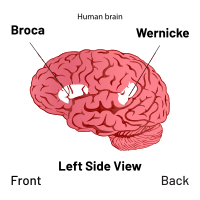- For a topical guide of this subject, see Outline of linguistics
Welcome to the Linguistics Portal!Linguistics is the scientific study of language. The areas of linguistic analysis are syntax (rules governing the structure of sentences), semantics (meaning), morphology (structure of words), phonetics (speech sounds and equivalent gestures in sign languages), phonology (the abstract sound system of a particular language), and pragmatics (how the context of use contributes to meaning). Subdisciplines such as biolinguistics (the study of the biological variables and evolution of language) and psycholinguistics (the study of psychological factors in human language) bridge many of these divisions. Linguistics encompasses many branches and subfields that span both theoretical and practical applications. Theoretical linguistics (including traditional descriptive linguistics) is concerned with understanding the universal and fundamental nature of language and developing a general theoretical framework for describing it. Applied linguistics seeks to utilize the scientific findings of the study of language for practical purposes, such as developing methods of improving language education and literacy. Linguistic features may be studied through a variety of perspectives: synchronically (by describing the structure of a language at a specific point in time) or diachronically (through the historical development of a language over a period of time), in monolinguals or in multilinguals, among children or among adults, in terms of how it is being learnt or how it was acquired, as abstract objects or as cognitive structures, through written texts or through oral elicitation, and finally through mechanical data collection or through practical fieldwork. Linguistics emerged from the field of philology, of which some branches are more qualitative and holistic in approach. Today, philology and linguistics are variably described as related fields, subdisciplines, or separate fields of language study but, by and large, linguistics can be seen as an umbrella term. Linguistics is also related to the philosophy of language, stylistics, rhetoric, semiotics, lexicography, and translation. (Full article...) Selected article -Ain't is a contraction for am not, is not, are not, has not, and have not in the common English language vernacular. In some dialects ain't is also used as a contraction of do not, does not, and did not. The development of ain't for the various forms of to be not, to have not, and to do not occurred independently, at different times. The usage of ain't for the forms of to be not was established by the mid-18th century, and for the forms of to have not by the early 19th century. The usage of ain't is a perennial subject of controversy in English. Ain't is commonly used by many speakers in oral or informal settings, especially in certain regions and dialects. Its usage is often highly stigmatized, and it may be used as a marker of socio-economic or regional status or education level. Its use is generally considered non-standard by dictionaries and style guides except when used for rhetorical effect, and it is rarely found in formal written works. Did you know...From Wikipedia's "Did You Know" archives: 
Related PortalsThings you can do
WikiProjectsThe following WikiProjects work to improve topics concerned with linguistics:
Associated WikimediaThe following Wikimedia Foundation sister projects provide more on this subject:
Discover Wikipedia using portals |


























